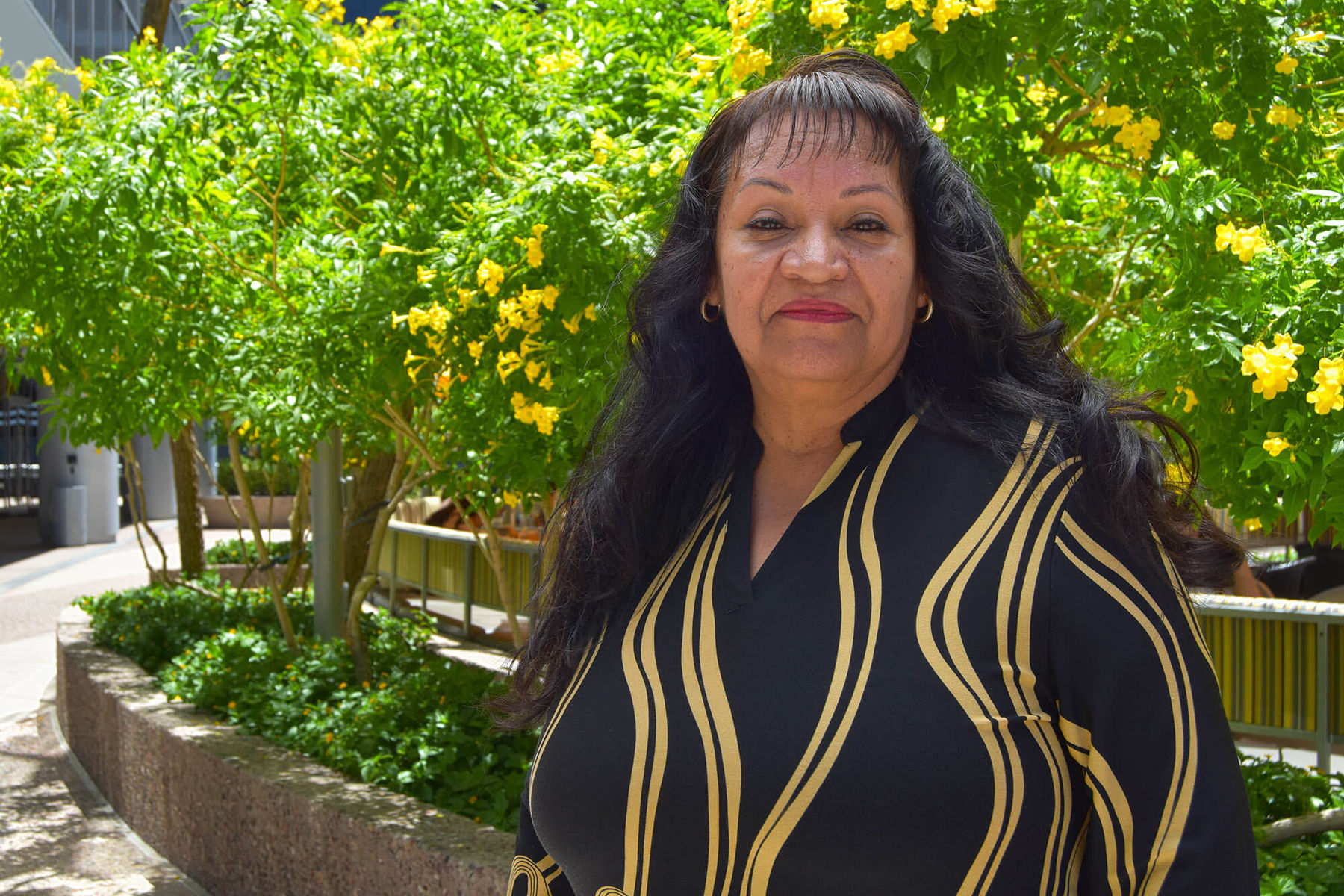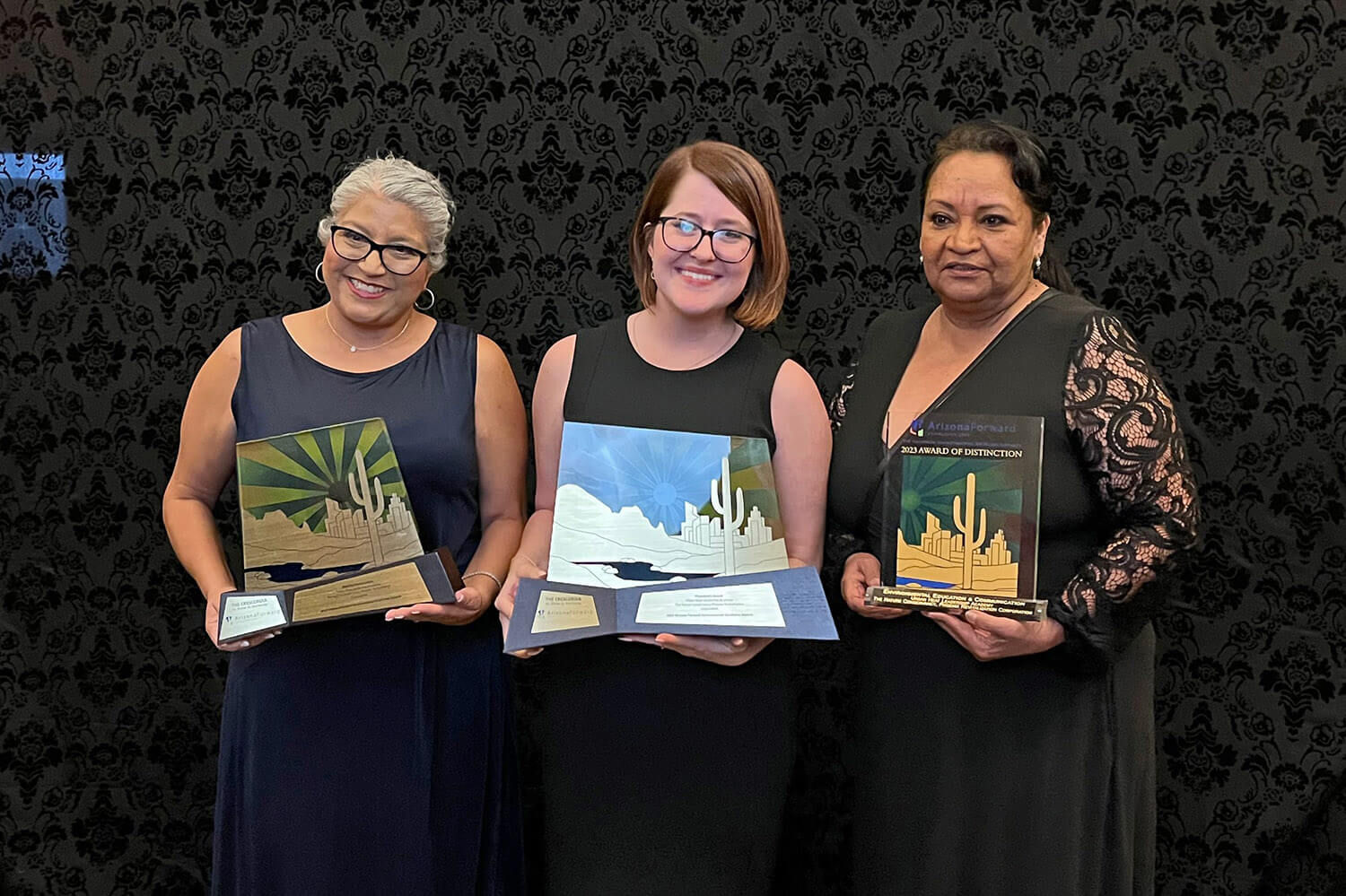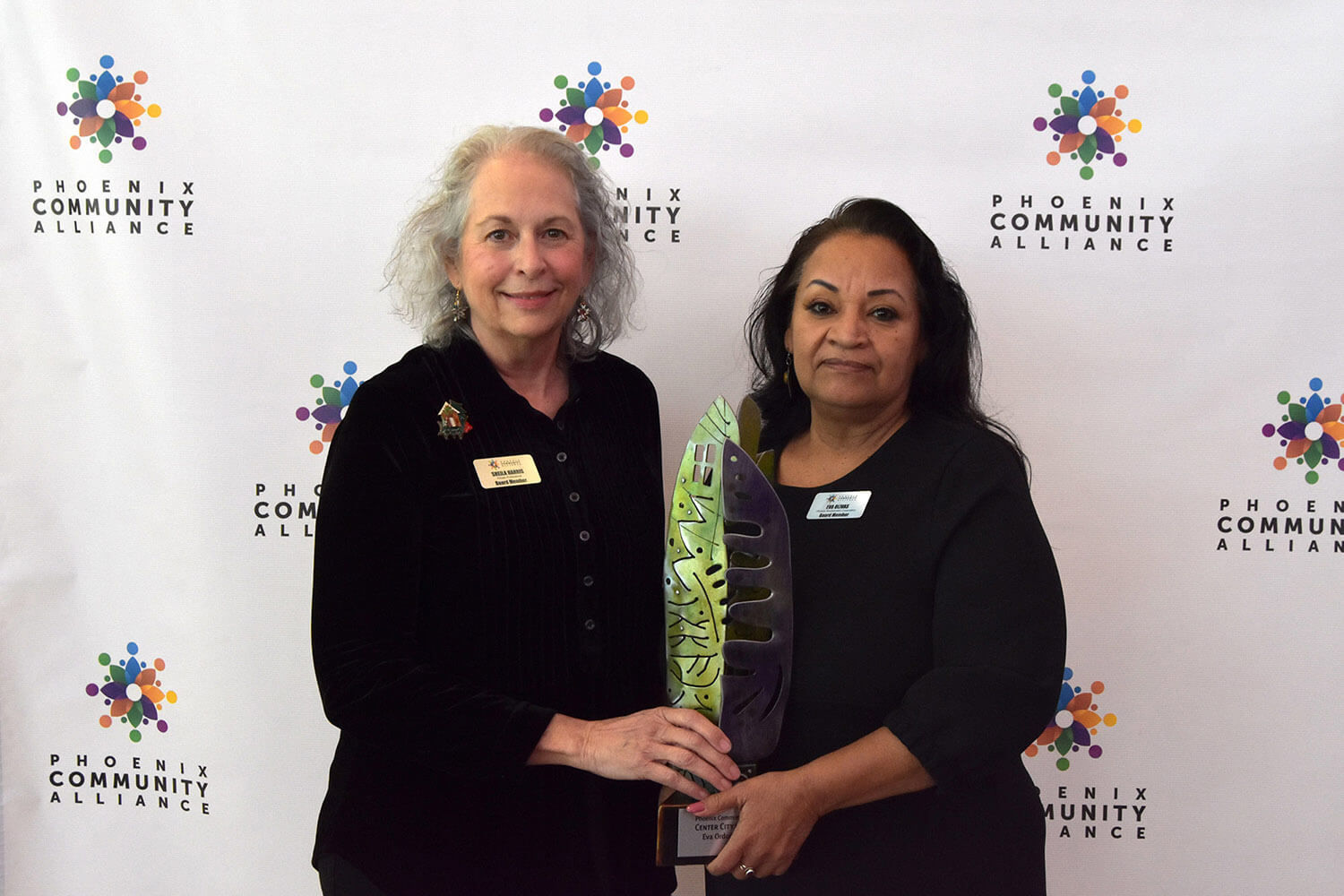Meet Eva Olivas: A Phoenix Community Alliance "City-Shaper"
There’s a resilient community located south of the Downtown Business District and the Arizona State Capitol Mall called Central City South, and one organization empowers them.
Phoenix Revitalization Corporation (PRC) and its Executive Director and CEO, Eva Olivas, are forces of nature. Since 2005, Olivas has advocated for under-represented communities around metro Phoenix, which includes this community south of Downtown.
Under her leadership, PRC has furthered initiatives on how to revitalize neighborhoods by facilitating community improvement projects. For instance, PRC expanded its communication system in Central City South after her arrival. A notable result was that a two-page newsletter became a 20-page newsletter featuring family programming, educational opportunities, community meetings, and updates.
In addition to her seat on the Downtown Phoenix Inc. (DPI), Phoenix Community Alliance (PCA), and Downtown Phoenix Community Development Corporation (DPCDC) Board of Directors, her sweat equity is represented on other municipal and transportation boards. Olivas breaks down technical language for these communities’ collective benefit, and constant dialogue and advocacy ensure bike lanes and other pedestrian infrastructure reach them.
In turn, her voice inspires other organizations to ensure these communities to the south are represented in decisions that affect their neighborhood.
The “City-Shapers” series fills in the gaps in historical knowledge of Phoenix Community Alliance and its leaders. This four-decade-old business advocacy organization has influenced the growth of Downtown and beyond.

Q: Who are the people who shaped you into who you are today?
Eva Olivas: If there’s anybody, it’s probably my mom. There’s so much of her in me. My mom was kind yet direct but also fair.
She taught me how to process being fair in conversations without knowing it. She always looked at both sides, and we would talk constantly to understand it.
Service was another thing that made me feel this sense of responsibility. My dad served in the Army, my brother went to Korea, and my uncle was in the reserves in Vietnam and Desert Storm. My uncle was Silvestre Herrera, a Congressional Medal of Honor recipient [in World War II].
Q: Many of Phoenix Revitalization Corporation’s (PRC) advocacy results in a reciprocal exchange of benefits. What does that give-and-take for Central City South look like in practice?
Olivas: It depends on what it is. There are little things we do everywhere.
When the impact of heat mitigation was becoming more of a day-to-day conversation in Phoenix, ASU called and wanted us to support a survey [for residents in Central City South].
And I said, “Only if the published survey would benefit the community, not just something with our participation.” It would need to address things in our Quality of Life Plan. Everyone wanted us to help them, and then they’d walk away.
In 2010, PRC received $400,000 of grant funding provided by a funding circle that included Arizona State University (ASU), Local Initiatives Support Corporation (LISC), Valley of the Sun United Way, and Vitalyst Health Foundation to activate neighborhood advocates and spur community development. With this additional funding, they created a Quality of Life Plan, an aspirational document of objectives for a future Central City South.
The plan aligns with the City of Phoenix’s Transportation-Oriented Development (TOD) Plan and identified eight placemaking strategies, including recreation, transportation, housing, education, and economic development. Since 2010, it has been revised once and is set to be revised again this year.
When it was completed, the Sherman Park Neighborhood Association and PRC were able to use this final report to advocate to the City of Phoenix Parks & Recreation Department to replant grass at their parkway [a narrow park space with recreation options located between 19th Avenue and I-17].

Q: Phoenix Revitalization Corp recently won three Arizona Forward Environmental Excellence Awards, including the top honor of the President’s Award, for your partnership with the Nature Conservancy on the Urban Heat Leadership Academy. Could you describe the program’s origins?
Olivas: The Nature Conservancy wanted to do a thing called Nature’s Cooling System, understanding how people in lower-income neighborhoods mitigate heat on their own. For example, they have their doctor’s appointments and grocery shopping on the same day because many of them take the bus. We only have a 28% vehicle ownership rate there.
They were very excited by the results and wanted to figure out another project. When we first started prior, they wanted to come in and have community meetings and ask questions.
And I said, “You’re not asking the right questions in the right way.” You’re asking people to advocate for you that don’t understand why it’s necessary to be an advocate.
First, you need to educate them so they can process what you’re saying and respond. They’ve not been exposed to that. We had two days of education to understand something like what a heat map was.
Advocating for the leadership of communities to make an impact has been the biggest thing we’ve done.
I have this rule: they are first, and I never forget that. The core value for PRC’s Board of Directors is resident-driven processes. Because they’ve survived so much, they’re smart. We work with respect and make sure we’re not overstepping.
Our mission is really about making them more powerful. PRC is a very humbling organization. We don’t historically boast about stuff; we’re too busy.
We’ve been fortunate in our speed of work; people recognize what we’re doing.
Q: Why is it important to the PRC Board that you represent Central City South at the PCA and DPI Board levels?
Olivas: People don’t understand that when you go over those railroad tracks [into the Downtown core], it’s like going to China.
Many PRC Board Members realize there are information, networks, and resources to help us maneuver challenges in Central City South. They’re doing stuff, and it matters to us, and I don’t think people realize it.
How do we blend history and the future into a well-prepared community for shared growth?
PRC’s work is helping people have a voice to make change happen in primarily low-income neighborhoods. And it takes work to balance that with supporting progress and development. I take my responsibility deeply being in the room.
There is a lot of unrecognized history south of the tracks. And they’ll tell you stories about how a Hispanic veteran couldn’t go to any other [American] Legion in the city because they were brown and had to build their own.
That’s why we do [the PRC Hearts & History Community bus] tours. We’ve been doing them [for ten years] since we published a Quality of Life Plan because the communities wanted us to figure out a way to introduce their stories.

Q: What drives you to keep being an advocate for Central City South?
Olivas: This is endless work. Some things that have to occur will happen over 30 to 40 years to improve home conditions and jobs in that neighborhood.
I want people to go into neighborhoods and say, “What can I bring to your neighborhood?” Instead of saying, “What can I get from your neighborhood?”
We’ll know it’s better when home conditions and the number of jobs people qualify for in that neighborhood go up.
It was originally warehouses and industry, but now it’s home. It’s a highly industrial area because it was the major transportation system for the railroad, freeway, and airport. Valley Metro will be there soon.
City systems are getting better at listening to people.
You got to look at the whole picture; you can’t just look at your own.
True to that ethos, Phoenix Revitalization Corporation stays strong with its public-private partnerships and advocates for low-income communities.
Last month, they began their third year of classes at the Urban Heat Leadership Academy with the Nature Conservancy. Their recent recognition at the Arizona Forward Awards allowed for additional visibility and funding for another three years.
They also recently helped organize a luncheon for state and local officials that inspired the adaptive reuse of a long-vacant Kmart into a workforce training and education center.
PRC is currently leasing its headquarters, and they look to establish a permanent location in the immediate future. Over the next ten years, Olivas anticipates the organization leading conversations about more livable yet affordable housing and discussions on the upcoming Rio Reimagined.
But wherever Olivas takes the organization, people inside and outside expect and value her input.
